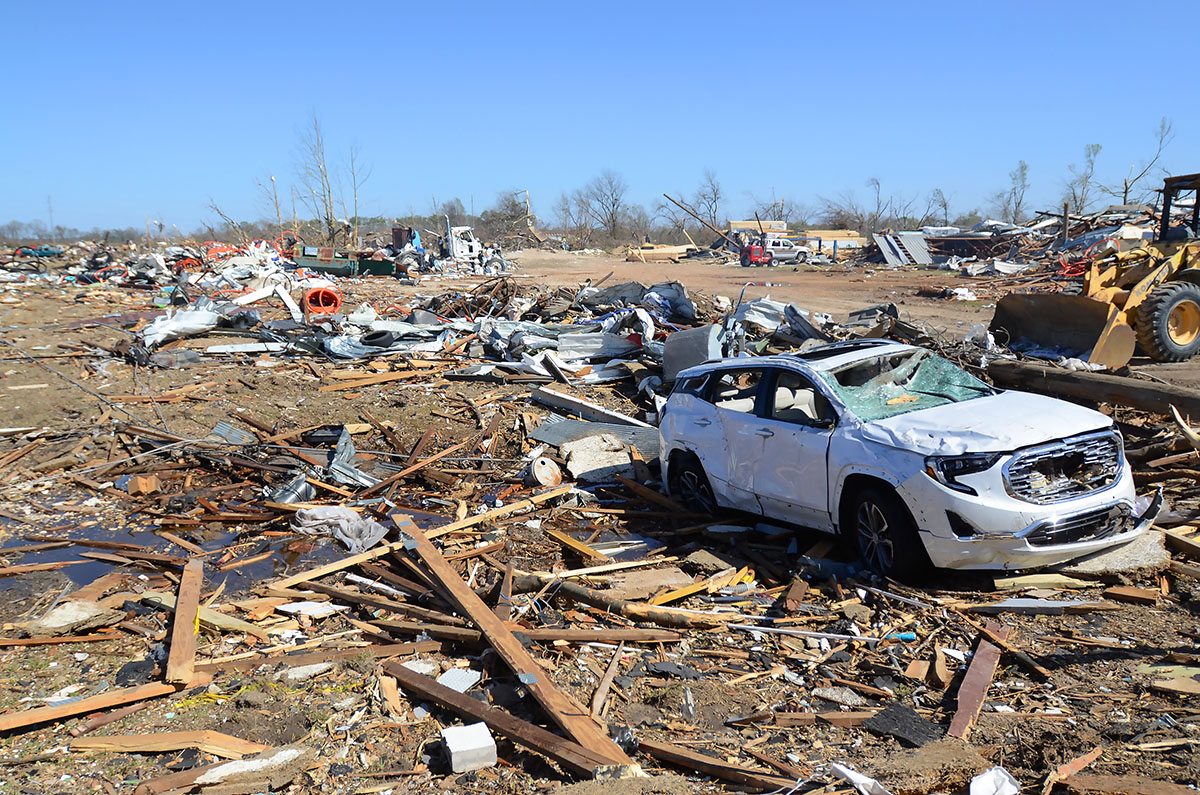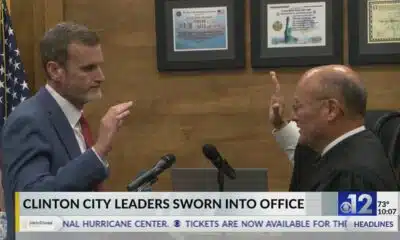Mississippi Today
Belzoni to Rolling Fork to Greenville: One mom’s mission to get her son medical help after the tornadoes
Belzoni to Rolling Fork to Greenville: One mom’s mission to get her son medical help after the tornadoes
Tameka Myles was at work Friday evening when she got the call every mother dreads.
“You need to get here,” her neighbor in Rolling Fork said. “Jay is hurt pretty bad.”
Immediately, Myles got in her Nissan Maxima with a coworker and raced home, with one thing on her mind: her son.
Myles knew the weather was bad that night, but she assumed it would pass, as usual. She figured her 10-year-old son Gregory “Jay” Brady Jr. would be safe at her cousin’s house while she was at work at the Bumpers in Belzoni about an hour away.
Instead, her hometown was decimated.
An EF-4 tornado ripped through the Mississippi Delta on Friday night. At least 25 people died, and dozens more were injured. Gov. Tate Reeves issued a state of emergency Saturday morning.
“My city – my city is gone,” Rolling Fork Mayor Eldridge Walker told CNN Saturday morning. “But we are resilient and we are going to come back strong.”
That night, Myles drove down pitch black roads and through downed power lines, one hand permanently pressed down on her car horn. She couldn’t fathom the devastation around her in the place she had grown up.

On the way there, Myles got a call from another neighbor who had picked up her son and taken him to the Rolling Fork Motel.
“It was the only place that she could get to, because they had everything blocked off,” Myles said.
Myles arrived at the motel to see her son sprawled out on a bed, bleeding from his side.
“I knew that I couldn’t break down,” she said. “I had to get my baby some help.”
The neighbor had already tried to get her son admitted at the local hospital, Sharkey Issaquena Community Hospital – the only hospital in the county. But it was full, and later lost power and had to transfer its patients to other hospitals.
The rural hospital has been struggling to stay afloat and was, as of September, seeking a buyer. It has continued to lose money over the years, even after pooling its resources with other small hospitals to buy supplies at a discounted rate.
EMTs said they’d return for Jay after taking someone already in the ambulance to Greenville, but the neighbor, a certified nurse assistant, knew the boy couldn’t wait.
When Myles heard her son couldn’t get emergency medical help, she was dumbfounded.
Malary White, chief communications officer at the Mississippi Emergency Management Agency, said emergency responders were en route to assist survivors within minutes after the storm and ambulances were dispatched from across the state to Sharkey County.
But she conceded that medical resources were stretched.
“Let’s keep in mind we were dealing with a mass casualty situation,” she said.
“Can they do that?” Myles kept asking. Myles couldn’t understand why her son couldn’t get help. But one thing was clear — she had to take matters into her own hands.
Myles and her coworker picked up Jay and loaded him into her car, before calling Jay’s father. They met up with him, transferred Jay to his car in the backseat because it was larger, and they sped the 41 miles toward Greenville, the closest place Myles knew Jay would be able to receive medical attention.
On the way there, Jay’s father kept calling Myles, telling her that Jay was complaining he couldn’t breathe. Myles started crying. Her coworker begged Myles to let him drive, but she refused.
“We’re not stopping,” she said. “We’ve got to get to Greenville.”
As they rolled into Greenville at 10 p.m., Myles blew past five red stop lights. Her coworker hung his head out of the window, yelling at bystanders to get out of the way. When Myles spotted the Delta Regional Medical Center, all she could think was, “Thank God we made it.”
Twenty minutes later, Myles discovered that Jay had four fractured ribs, and one of his lungs was punctured.

Someone with a punctured lung runs the risk of fatal complications like cardiac arrest, respiratory failure, shock and death if not treated quickly.
He’d need to be put on oxygen and transferred to a larger hospital —nurses at Delta Health told Myles that the hospital didn’t have the equipment to help Jay.
Saturday morning, Jay was taken by helicopter to Le Bonheur Children’s Hospital in Memphis. Myles joined him at noon.
That night, Myles pulled the recliner close to Jay’s hospital bed. She put two of her braids in his hand before he fell asleep, and told him to yank if he needed help. Then she slept for the first time in more than 24 hours.
Jay has since been taken off oxygen and is breathing on his own. He’s still got tubes in his side, but he’s talking more and smiling, and Myles is relieved.
But she’s haunted by the possibilities of what might have happened if she didn’t have a car. She wonders how quickly they’d be able to get help if they didn’t live in rural Mississippi.
“My options were limited. I knew I had to do it myself,” Myles said. “I don’t really want to think about me not being able to help my son.”
She still has no idea how her son was injured. All Myles can find out about her cousin, who Jay was with during the tornado, is that he’s in critical condition at a hospital in Jackson.
It’s not clear when Jay will be discharged. Multiple times a day, he asks when they can go home. Myles hasn’t told him yet that their home doesn’t exist anymore. Their trailer and everything in it was destroyed.
And now, after her son couldn’t get the help he needed, Myles isn’t so sure that she wants to return home. Things are only set to get worse: One report puts a third of Mississippi’s rural hospitals at risk of closure, making it even harder to access health care.
“I think what I’m going to do is we’re going to move to a bigger area, where we’ve got support,” Myles said. “Where we can get help.”
This article first appeared on Mississippi Today and is republished here under a Creative Commons license.
Did you miss our previous article…
https://www.biloxinewsevents.com/?p=228855
Mississippi Today
Trump nominates Baxter Kruger, Scott Leary for Mississippi U.S. attorney posts
President Donald Trump on Tuesday nominated Baxter Kruger to become Mississippi’s new U.S. attorney in the Southern District and Scott Leary to become U.S. attorney for the Northern District.
The two nominations will head to the U.S. Senate for consideration. If confirmed, the two will oversee federal criminal prosecutions and investigations in the state.
Kruger graduated from the Mississippi College School of Law in 2015 and was previously an assistant U.S. attorney for the Southern District. He is currently the director of the Mississippi Office of Homeland Security.
Sean Tindell, the Mississippi Department of Public Safety commissioner, oversees the state’s Homeland Security Office. He congratulated Kruger on social media and praised his leadership at the agency.
“Thank you for your outstanding leadership at the Mississippi Office of Homeland Security and for your dedicated service to our state,” Tindell wrote. “Your hard work and commitment have not gone unnoticed and this nomination is a testament to that!”
Leary graduated from the University of Mississippi School of Law, and he has been a federal prosecutor for most of his career.
He worked for the U.S. Attorney’s Office in the Western District of Tennessee in Memphis from 2002 to 2008. Afterward, he worked at the U.S. Attorney’s Office for the Northern District of Mississippi in Oxford, where he is currently employed.
Leary told Mississippi Today that he is honored to be nominated for the position, and he looks forward to the Senate confirmation process.
This article first appeared on Mississippi Today and is republished here under a Creative Commons Attribution-NoDerivatives 4.0 International License.
The post Trump nominates Baxter Kruger, Scott Leary for Mississippi U.S. attorney posts appeared first on mississippitoday.org
Note: The following A.I. based commentary is not part of the original article, reproduced above, but is offered in the hopes that it will promote greater media literacy and critical thinking, by making any potential bias more visible to the reader –Staff Editor.
Political Bias Rating: Centrist
This article presents a straightforward news report on President Donald Trump’s nominations of Baxter Kruger and Scott Leary for U.S. attorney positions in Mississippi. It focuses on factual details about their backgrounds, qualifications, and official responses without employing loaded language or framing that favors a particular ideological perspective. The tone is neutral, with quotes and descriptions that serve to inform rather than persuade. While it reports on a political appointment by a Republican president, the coverage remains balanced and refrains from editorializing, thus adhering to neutral, factual reporting.
Mississippi Today
Jackson’s performing arts venue Thalia Mara Hall is now open
After more than 10 months closed due to mold, asbestos and issues with the air conditioning system, Thalia Mara Hall has officially reopened.
Outgoing Mayor Chokwe A. Lumumba announced the reopening of Thalia Mara Hall during his final press conference held Monday on the arts venue’s steps.
“Today marks what we view as a full circle moment, rejoicing in the iconic space where community has come together for decades in the city of Jackson,” Lumumba said. “Thalia Mara has always been more than a venue. It has been a gathering place for people in the city of Jackson. From its first class ballet performances to gospel concerts, Thalia Mara Hall has been the backdrop for our city’s rich cultural history.”
Thalia Mara Hall closed last August after mold was found in parts of the building. The issues compounded from there, with malfunctioning HVAC systems and asbestos remediation. On June 6, the Mississippi State Fire Marshal’s Office announced that Thalia Mara Hall had finally passed inspection.
“We’re not only excited to have overcome many of the challenges that led to it being shuttered for a period of time,” Lumumba said. “We are hopeful for the future of this auditorium, that it may be able to provide a more up-to-date experience for residents, inviting shows that people are able to see across the world, bringing them here to Jackson. So this is an investment in the future.”
In total, Emad Al-Turk, a city contracted engineer and owner of Al-Turk Planning, estimates that $5 million in city and state funds went into bringing Thalia Mara Hall up to code.
The venue still has work to be completed, including reinstalling the fire curtain. The beam in which the fire curtain will be anchored has asbestos in it, so it will have to be remediated. In addition, a second air-conditioning chiller needs to be installed to properly cool the building. Until it’s installed, which could take months, Thalia Mara Hall will be operating at a lower seating capacity of about 800.
“Primarily because of the heat,” Al-Turk said. “The air conditioning would not be sufficient to actually accommodate the 2,000 people at full capacity, but starting in the fall, that should not be a problem.”
Al-Turk said the calendar is open for the city to begin booking events, though none have been scheduled for July.
“We’re very proud,” he said. “This took a little bit longer than what we anticipated, but we had probably seven or eight different contractors we had to coordinate with and all of them did a superb job to get us where we are today.”
This article first appeared on Mississippi Today and is republished here under a Creative Commons Attribution-NoDerivatives 4.0 International License.
The post Jackson’s performing arts venue Thalia Mara Hall is now open appeared first on mississippitoday.org
Note: The following A.I. based commentary is not part of the original article, reproduced above, but is offered in the hopes that it will promote greater media literacy and critical thinking, by making any potential bias more visible to the reader –Staff Editor.
Political Bias Rating: Centrist
The article presents a straightforward report on the reopening of Thalia Mara Hall in Jackson, focusing on facts and statements from city officials without promoting any ideological viewpoint. The tone is neutral and positive, emphasizing the community and cultural significance of the venue while detailing the challenges overcome during renovations. The coverage centers on public investment and future prospects, without partisan framing or editorializing. While quotes from Mayor Lumumba and a city engineer highlight optimism and civic pride, the article maintains balanced, factual reporting rather than advancing a political agenda.
Mississippi Today
‘Hurdles waiting in the shadows’: Lumumba reflects on challenges and triumphs on final day as Jackson mayor
On his last day as mayor of Jackson, Chokwe Antar Lumumba recounted accomplishments, praised his executive team and said he has no plans to seek office again.
He spoke during a press conference outside of the city’s Thalia Mara Hall, which was recently cleared for reopening after nearly a year of remediation. The briefing, meant to give media members a peek inside the downtown theater, marked one of Lumumba’s final forays as mayor.
Longtime state Sen. John Horhn — who defeated Lumumba in the Democratic primary runoff — will be inaugurated as mayor Tuesday, but Lumumba won’t be present. Not for any contentious reason, the 42-year-old mayor noted, but because he returns to his private law practice Tuesday.
“I’ve got to work now, y’all,” Lumumba said. “I’ve got a job.”
Thalia Mara Hall’s presumptive comeback was a fitting end for Lumumba, who pledged to make Jackson the most radical city in America but instead spent much of his eight years in office parrying one emergency after another. The auditorium was built in 1968 and closed nearly 11 months ago after workers found mold caused by a faulty HVAC system – on top of broken elevators, fire safety concerns and vandalism.
“This job is a fast-pitched sport,” Lumumba said. “There’s an abundance of challenges that have to be addressed, and it seems like the moment that you’ve gotten over one hurdle, there’s another one that is waiting in the shadows.”
Outside the theater Monday, Lumumba reflected on the high points of his leadership instead of the many crises — some seemingly self-inflicted — he faced as mayor.
He presided over the city during the coronavirus pandemic and the rise in crime it brought, but also the one-two punch of the 2021 and 2022 water crises, exacerbated by the city’s mismanagement of its water plants, and the 18-day pause in trash pickup spurred by Lumumba’s contentious negotiations with the city council in 2023.
Then in 2024, Lumumba was indicted alongside other city and county officials in a sweeping federal corruption probe targeting the proposed development of a hotel across from the city’s convention center, a project that has remained stalled in a 20-year saga of failed bids and political consternation.
Slated for trial next year, Lumumba has repeatedly maintained his innocence.
The city’s youngest mayor also brought some victories to Jackson, particularly in his first year in office. In 2017, he ended a furlough of city employees and worked with then-Gov. Phil Bryant to avoid a state takeover of Jackson Public Schools. In 2019, the city successfully sued German engineering firm Siemens and its local contractors for $89 million over botched work installing the city’s water-sewer billing infrastructure.
“I think that that was a pivotal moment to say that this city is going to hold people responsible for the work that they do,” Lumumba said.
Lumumba had more time than any other mayor to usher in the 1% sales tax, which residents approved in 2014 to fund infrastructure improvements.
“We paved 144 streets,” he said. “There are residents that still are waiting on their roads to be repaved. And you don’t really feel it until it’s your street that gets repaved, but that is a significant undertaking.”
And under his administration, crime has fallen dramatically recently, with homicides cut by a third and shootings cut in half in the last year.
Lumumba was first elected in 2017 after defeating Tony Yarber, a business-friendly mayor who faced his own scandals as mayor. A criminal justice attorney, Lumumba said he never planned to seek office until the stunning death of his father, Chokwe Lumumba Sr., eight months into his first term as mayor in 2014.
“I can say without reservation, and unequivocally, we remember where we started. We are in a much better position than we started,” Lumumba said.
Lumumba said he has sat down with Horhn in recent months, answered questions “as extensively as I could,” and promised to remain reachable to the new mayor.
This article first appeared on Mississippi Today and is republished here under a Creative Commons Attribution-NoDerivatives 4.0 International License.
The post 'Hurdles waiting in the shadows': Lumumba reflects on challenges and triumphs on final day as Jackson mayor appeared first on mississippitoday.org
Note: The following A.I. based commentary is not part of the original article, reproduced above, but is offered in the hopes that it will promote greater media literacy and critical thinking, by making any potential bias more visible to the reader –Staff Editor.
Political Bias Rating: Center-Left
The article reports on outgoing Jackson Mayor Chokwe Antar Lumumba’s reflections without overt editorializing but subtly frames his tenure within progressive contexts, emphasizing his self-described goal to make Jackson “the most radical city in America.” The piece highlights his accomplishments alongside challenges, including public crises and a federal indictment, maintaining a factual tone yet noting contentious moments like labor disputes and governance issues. While it avoids partisan rhetoric, the focus on social justice efforts, infrastructure investment, and crime reduction, as well as positive framing of Lumumba’s achievements, aligns with a center-left perspective that values progressive governance and accountability.
-
Mississippi Today6 days ago
Defendant in auditor’s ‘second largest’ embezzlement case in history goes free
-
News from the South - Georgia News Feed5 days ago
Are you addicted to ‘fridge cigarettes’? Here’s what the Gen Z term means
-
News from the South - Florida News Feed7 days ago
Marcos Lopez arrest: Owner of club named in RICO document
-
The Conversation6 days ago
Toxic algae blooms are lasting longer than before in Lake Erie − why that’s a worry for people and pets
-
News from the South - Tennessee News Feed6 days ago
5 teen boys caught on video using two stolen cars during crash-and-grab at Memphis gas station
-
News from the South - South Carolina News Feed4 days ago
Federal investigation launched into Minnesota after transgender athlete leads team to championship
-
Local News6 days ago
St. Martin trio becomes the first females in Mississippi to sign Flag Football Scholarships
-
Local News6 days ago
Mississippi Power shares resources and tips for lowering energy bill in the summer



















































